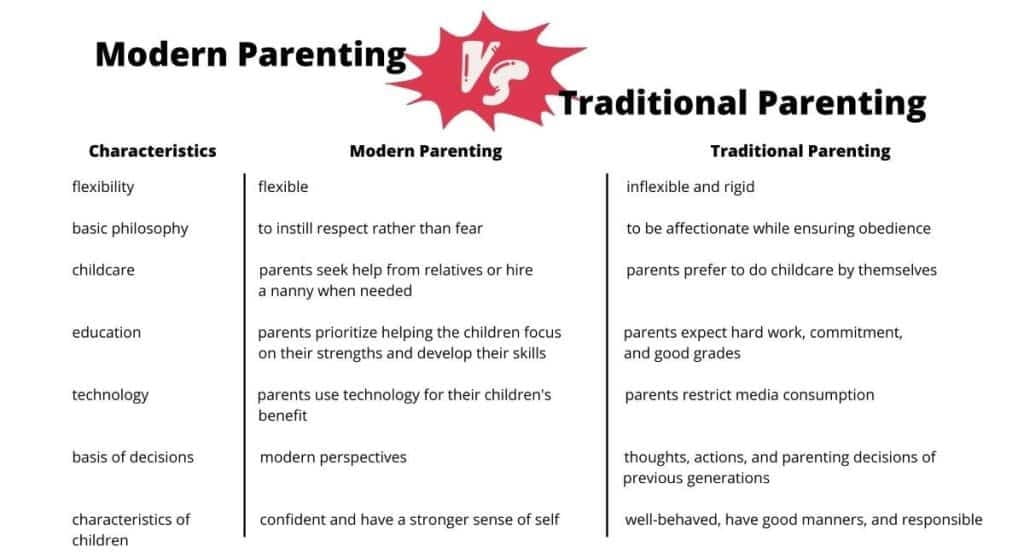Today, the world undergoes fast changes in various aspects such as technology and culture which have tremendously influenced how people bring up their children. This change has led to two different parenting styles; traditional parenting and modern parenting.
Each of these methods has its own beliefs that affect a child’s growth in different ways. The purpose of this paper is to highlight some of the main differences between traditional parenting and modern parenting ways of raising children so that you can choose what suits your family’s values and aspirations best.
Traditional Parenting
This type of raising kids is based on customs handed down over generations usually rooted in cultural or familial norms. It emphasizes authority obedience and strong family bonds among others.
Parents who practice traditional style set boundaries for their offspring; they may establish strict rules, require observance of cultural protocols among other things but most importantly demand respect for elders and figures of authority.
This particular kind of parenting may also have a more organized way of raising children, with well-stated rules regarding behaviour and known consequences for failure to comply.
While the traditional can instill discipline and respect for authority in kids, it may also restrict their opportunities to express themselves freely or make choices for themselves.

Modern Parenting
Modern parenting embraces current values and accentuates open communication, emotional wisdom as well as self-expression. This method fosters collaboration between parents & children by creating an atmosphere where children feel free to voice out their thoughts and opinions without fear.
Parents who use postmodern styles try guiding their sons/daughters through rewards that are positive-based while still applying gentle correction when need be.
The focus in modern-day child-rearing is often on emotional healthiness promotion alongside critical thinking skills development among young ones so that they become better problem solvers later on in life.
Creativity could be nurtured by allowing individuality to shine through thus giving room for personal decisions making by kids who will also learn from such experiences but this does not mean setting boundaries becomes less important since failure to do so might lead to loss of control over them altogether

Key Differences Between Traditional Parenting and Modern Parenting

Communication Styles
Traditional Parenting style
In traditional parenting, communication is usually “one way street” where parents give orders and expect kids to obey without much deliberation.
This may help set clear expectations and develop respect for authority, however, it can also prevent children from expressing their views or emotions.
Modern Parenting style
Unlike traditional methods, modern parenting emphasizes open dialogue between mothers/fathers and sons/daughters. Children are allowed to share what they think or feel about various issues affecting them whereas parents often factor this while coming up with decisions.
Such an approach builds trust as well as emotional closeness but may bring about difficulties in establishing firm limits.
Discipline Strategies
Traditional Parenting
Discipline under these settings tends to be inflexible since everything revolves around punishment for breaking rules mainly. The consequences are usually obvious and immediate like time-outs or loss of privileges.
This helps kids to realize the implications of their actions but it can also create a fear of failure in them.
Modern Parenting
On the other hand, positive reinforcement together with natural outcomes takes center stage with new age moms/dads. Parents often use discipline as a chance for teaching rather than punishing children when they make mistakes.
Such an attitude can foster self-control besides understanding others’ feelings but may demand more patience and extra time from guardians too.
Family Dynamics
Traditional Parenting
In traditional parenting mathods , family chains are set in stone with the parents being on the top. They expect respect from their children.
This creates orderliness and well-structuredness in a family, but at the same time limits freedom of choice as well independence among kids.
Modern Parenting
Modern parenting methods emphasizes equality within the household; this means that decisions should be made through cooperation between parents and their children who work together towards problem-solving too.
Although it fosters an attitude of fairness alongside collaboration, it may also challenge conventional values respecting authority.
Emotional Support
Traditional Parenting
Traditional parents do not give much emotional support because they consider practicality more important than feelings. Such an attitude helps young ones build up strength against adversities but can also lead to suppression of emotions thus difficulty in expressing oneself emotionally.
Modern Parenting
One thing that sets modern parenting apart is its emphasis on emotional backing; whereby moms or dads will ask for a child’s opinion about something and try to understand them better by showing empathy when they share their feelings.
This method aids in the development of emotional intelligence among kids while teaching them healthier ways through which they can deal with various situations.
Advantages and Disadvantages of Traditional Parenting and Modern Parenting
Traditional Parenting
Advantages
| Provides clear structure and boundaries for children |
| Encourages respect for authority and elders |
| Instills discipline and a strong work ethic |
Disadvantages
| May limit children’s self-expression and decision-making abilities |
| Can create fear of making mistakes |
| May not prioritize emotional support |
Modern Parenting
Advantages
| Promotes open communication and emotional intimacy |
| Encourages creativity and individuality |
| Fosters emotional intelligence and empathy |
Disadvantages
| Can lead to challenges in setting boundaries and maintaining authority |
| May require more time and effort from parents |
| Potential for overemphasis on children’s desires |
Conclusion
There is no one-size-fits-all answer when comparing traditional parenting and modern parenting; both have their own values systems along with practices that can influence how kids grow.
Recognizing this dichotomy between the two ways can help guardians choose what’s right for their families based on the description given above.
FAQs Traditional Parenting and Modern Parenting
Q: What type of parenting is best for child development?
A: Traditional parenting and modern parenting each have their own positives. The right choice depends on your family’s personal values and what is good for the child. A mix of these two methods might be helpful in teaching respect for authority, while at the same time promoting open communication and providing emotional support.
Q: How do parents choose which style to use in raising their children?
A: They should look at their ethical principles, aspirations, and specific requirements of the kids. It could also help if they talked with other mothers or got advice from experts who deal with children.
Q: Is it possible to practice both traditional parenting and modern parenting techniques?
A: Yes, many families find that a combination of traditional parenting and modern parenting is most effective for them. By incorporating aspects from each style parent can foster respect, communication skills as well as emotional health within homes.
Q: What challenges do parents face with different parenting styles?
A: Traditional parenting may have some difficulties as disciplining children becomes a balancing act between nurturing their emotional needs and laying down rules. Modern parenting on the other hand, could challenge moms or dads by requiring them to establish clear boundaries which must then be consistently enforced. Additionally, when it comes to mixing traditional parenting and modern parenting together there might also arise certain problems encountered by parents wanting to do so.

Russell F. Jones, holding a Master in psychology from the University of Florida. He writes for Smart Parent Solutions, offering practical advice on parenting and child development. His engaging content helps parents navigate family life with confidence and ease. Russell enjoys sharing his knowledge and spending quality time with his family.
